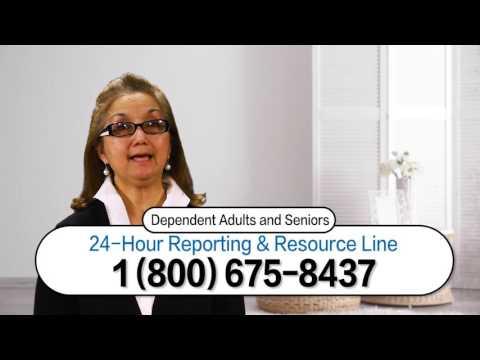See, Stop, Prevent: Dependent & Older Adult Abuse
For every reported case of older adult abuse, 24 cases go unreported. Help stop the cycle—it’s everyone’s business. Do you suspect a loved one is experiencing abuse or are you experiencing abuse? To report suspected abuse or neglect call 1-844-868-0938 to speak to a trained staff member 24 hours a day, 7 days a week.
(The identity of the person reporting elder abuse is protected and may be shared only with the those listed in WI 15633.5(b). Confidentiality may be waived by the reporter or by court order. You may also report elder abuse without providing your name.)If you are a mandated reporter, you can quickly and confidentially file electronically an SOC 341 (Report of Suspected Abuse) or SOC 342 (For use ONLY by Financial Institutions to report financial abuse).
Abuse can be financial, physical, emotional, or sexual, and can also include neglect or isolation. Signs and symptoms can appear as someone not being cared for, having unexplained bruises, being depressed or anxious, or having unusual bank account activity.
San Mateo County’s older adult population is expected to grow by over 70% by 2030. As more people grow older in San Mateo County, we need to ensure everyone is able to do so safely.
What is Elder and Dependent Adult Abuse?
Financial abuse
Financial abuse is when someone misuses, mishandles, or exploits an elderly or dependent adult’s property, possessions, or financial assets. This includes using those assets without the individual’s consent or manipulating the older or dependent adult for the financial benefit of another.
Neglect
Neglect takes place when, intentionally or unintentionally, a caregiver fails to support the physical, emotional, and social needs of the older or dependent adult. Neglect can include denying food or medication, health services or contact with friends and family.
Self-Neglect
Self-Neglect requires intervention when elderly or dependent adults cannot meet their own physical, psychological, or social needs or they threaten their own health or safety. Typically, physical or mental illness, isolation, or substance abuse can prevent elderly or dependent adults from being able to take care of their own basic needs.
Physical Abuse
Physical Abuse includes slapping, hitting, bruising, beating, and other intentional acts that causes someone physical pain, injury, or suffering. Physical abuse also includes excessive forms of restraint used to confine someone against their will (i.e. tying, chaining, or locking someone in a room).
Emotional Abuse
Emotional Abuse is threatening, intimidating, or humiliating an individual and causing them emotional pain, distress, or anguish. Emotional abuse can be verbal or non-verbal; it includes insults, yelling, and threats of harm or isolation.
Sexual Abuse
Sexual Abuse is any sexual activity to which the older or dependent adult does not consent or is not capable of consenting. Non-consensual sexual activity includes everything from exhibitionism to sexual intercourse.
Isolation
Isolation can be any of the following:
- Acts intentionally committed for the purpose of preventing elder or dependent adult from receiving his or her mail or telephone calls.
- Telling a caller or potential visitor that an elder or dependent adult is not available or does not want to see or speak with someone when it’s contrary to an elder or the dependent adult’s wishes, whether he or she is competent or not, and is made for the purpose of preventing the elder or dependent adult from having outside contact.
- False imprisonment, as defined in Section 236 of the Penal Code.
- Physical restraint of an elder or dependent adult, for the purpose of preventing the elder or dependent from seeing visitors.
Abandonment
Abandonment occurs when a caregiver deserts the elderly or dependent person.
What are the signs of abuse?
It’s better to call and be wrong than be right and do nothing. There are many signs that mean someone needs your help. These signs do not always mean the person is being abused or neglected, but they may be clues that something isn’t right. Call the Aging and Adult Services Hotline 1-844-868-0938 and a trained staff member can analyze the signs all while keeping your information confidential.
- It may be a sign that an elder or dependent adult may be abused if they:
- Appear uncared for and has poor personal hygiene
- Have unexplained bruises, sores, burns
- Is depressed, confused, afraid, agitated, atypical behavior, withdrawn
- Shows fear or anxiety around certain household members or caregivers
- Have an adult child or caregiver overly dependent on the older adult for income or shelter
- Have changes in appetite or a dramatic weight gain or loss
- Is unable to do basic things such as make meals, shop, or get around
- Have unusual activity in bank account, giving money away, has unpaid bills or cannot buy food
- Is isolated and has restricted visits or phone calls
Take a stand and make the call—you could be saving someone’s life.
Elder Abuse Resources
For more resources, please see the Help at Home Directory https://www.smchealth.org/helpathome.
